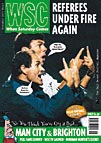 English clubs are struggling in Europe
English clubs are struggling in Europe
It’s not often that something Graham Taylor once said comes flooding back but it happened last week, after another set of bad results for English and Scottish clubs in Europe.
It was some time in the mid 1980s. Watford were riding high in the old First Division and Graham was on TV, expounding. He talked about how Watford’s playing success had clearly upset certain people because they were not at all “sophisticated”. He snarled the word, then, after pausing to rearrange his features into a half smile, went on, “I hate sophisticated football.”
His audience would have understood what he was referring to – it was football played with unneccesary elaboration, a ‘Continental’ style copied here by teams who didn’t win anything but were nonetheless admired by the metropolitan types who sneered at Watford and got Graham’s dander up.
At the time that Taylor was talking it seemed that the ‘sophisticates’ had been rumbled for good. This was a period when the English were doing well in Europe, to the extent of dominating the European Cup for an eight-year period up to the post-Heysel ban, usually giving ‘disciplined’ performances characterized by English footballing virtues, founded on physical strength, speed and stamina.
This was also a time when, with a few exceptions, foreigners playing in England weren’t taken seriously; most of those who had come here were perceived, unfairly, to be simply unsuited to ‘our’ way of playing. A decade on, English teams are finding it increasingly hard to win matches in European competition, and overseas players are making more of an impact in the English League than ever before.
Their arrival in increasing numbers is as much an effect of the recent upheaval in the football economy (discussed in the features elsewhere in this issue) as it is an acknowledgment of their worth, but they are doing better for much the same reasons that foreign teams’ performances against English clubs have improved.
These teams are fitter and stronger than they once were, generally better able to match English opponents over ninety minutes, but they’ve made these gains without an equivalent loss in levels of technique; they’ve caught up with us in one area while remaining ahead in another.
In the process, myths about disciplined football, about what it is exactly and who abides by it, have been turned on their head. It is the English who now seem undisciplined. Aston Villa and Blackburn have both lost UEFA Cup ties to Swedish sides who played a cautious, defensive game, challenging their opponents to break them down.
The Swedes were given instructions and they stuck to them; the English teams, conversely, didn’t seem to have any particular idea of how they might apply themselves to their task (once again confusing patience with a lack of penetration, as though square passing across the back is a ‘European’ thing to do ) and hoped instead to be rescued by a moment of individual skill, from Alan Shearer in Blackburn’s case, from Dwight Yorke in Villa’s.
The Swedish teams were playing a ‘sophisticated’ game, but in a different sense to that used by Graham Taylor a decade ago when describing a sort of football he didn’t like: they approach a match as a complex problem that has to be thought through and overcome, an attitude that English sides seem unwilling to take. (It extends beyond the pitch, too with developments in sports science being followed more closely overseas than here, notably in area relating to players’ health and fitness)
This is in part due to the suspicion of analysis of any sort, and an attendant terror of seeming pretentious, that is deeply embedded in our football culture. More to blame, though, are the false expectations that are raised every week by the hype that now surrounds Premiership football, specifically the notion that games turn on moments of magic from star players; every match that isn’t a free-flowing goalfest is judged a disaster in the Monday morning post mortems and is always placed in the context of the amount of money the players are being paid, and the amount that the customers have paid for the right to be entertained.
Football is being presented as a battle between individuals, and like every other sort of battle, there isn’t much time allowed for thought; even then, much of the responsibility for thinking seems to fall upon overseas players imported to do the things that their British teammates often appear to have had ‘coached’ out of them.
Still, at least the synchronised goal celebrations that we all enjoy so much have become the envy of the football world. Haven’t they?
From WSC 117 November 1996. What was happening this month